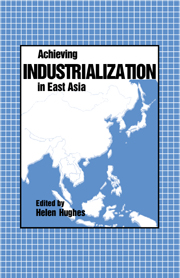Book contents
- Frontmatter
- Contents
- List of figures
- List of tables
- Contributors to this volume
- Preface
- Abbreviations
- Symbols
- 1 Economic Development in East Asia: Doing What Comes Naturally?
- 2 Industrialization and Growth: Alternative Views of East Asia
- 3 The Role of Trade Policies in the Industrialization of Rapidly Growing Asian Developing Countries
- 4 The Role of Foreign Capital in East Asian Industrialization, Growth and Development
- 5 The Role of Government in Overcoming Market Failure: Taiwan, Republic of Korea and Japan
- 6 Growth, Industrialization and Economic Structure: Latin America and East Asia Compared
- 7 Ideology and Industrialization in India and East Asia
- 8 Japan: Model for East Asian Industrialization?
- 9 The Politics of Industrialization in the Republic of Korea and Taiwan
- 10 Economic Growth in the Asean Region: the Political Underpinnings
- 11 Culture and Industrialization
- Bibliography
- Index
1 - Economic Development in East Asia: Doing What Comes Naturally?
Published online by Cambridge University Press: 06 October 2009
- Frontmatter
- Contents
- List of figures
- List of tables
- Contributors to this volume
- Preface
- Abbreviations
- Symbols
- 1 Economic Development in East Asia: Doing What Comes Naturally?
- 2 Industrialization and Growth: Alternative Views of East Asia
- 3 The Role of Trade Policies in the Industrialization of Rapidly Growing Asian Developing Countries
- 4 The Role of Foreign Capital in East Asian Industrialization, Growth and Development
- 5 The Role of Government in Overcoming Market Failure: Taiwan, Republic of Korea and Japan
- 6 Growth, Industrialization and Economic Structure: Latin America and East Asia Compared
- 7 Ideology and Industrialization in India and East Asia
- 8 Japan: Model for East Asian Industrialization?
- 9 The Politics of Industrialization in the Republic of Korea and Taiwan
- 10 Economic Growth in the Asean Region: the Political Underpinnings
- 11 Culture and Industrialization
- Bibliography
- Index
Summary
Little else is requisite to carry a state to the highest degree of opulence from the lowest barbarism, but peace, easy taxes, and tolerable administration of justice; all the rest being brought about by the natural course of things. (Adam Smith, An Inquiry into the Nature and Causes of the Wealth of Nations, 1776)
The market-oriented East Asian developing economies, especially the most successful among them – the Republic of Korea, Taiwan, Hong Kong and Singapore – have had a profound influence on development economics. Their superlative economic performance, combined with the relatively poor record of other countries which adhered more closely to the inward-looking policies universally prescribed in the 1950s and 1960s, nurtured a ‘new orthodoxy’ in development economics. The new orthodoxy was in essence mainstream, neo-classical economics, dismissed by the old orthodoxy as inapplicable to developing countries. The experience of this rapidly growing ‘Gang of Four’ was interpreted initially as proof positive that competitive markets, operating broadly on neoclassical principles, could, even in developing countries, generate high levels of economic efficiency and rapid, self-sustained growth.
That interpretation has, however, come under increasing attack on two fronts. One challenge questions the basic proposition that the East Asian countries have in fact been more successful than other countries when account is taken of dimensions of development other than GNP growth. Sen (1983:753), for example, lays the charge obliquely noting simply that:
South Korea, with its magnificent and much-eulogised growth record, has not yet overtaken [the People's Republic of] China or Sri Lanka in the field of longevity, despite being now more than five times richer in terms of per capita GNP.
- Type
- Chapter
- Information
- Achieving Industrialization in East Asia , pp. 1 - 38Publisher: Cambridge University PressPrint publication year: 1988
- 28
- Cited by



